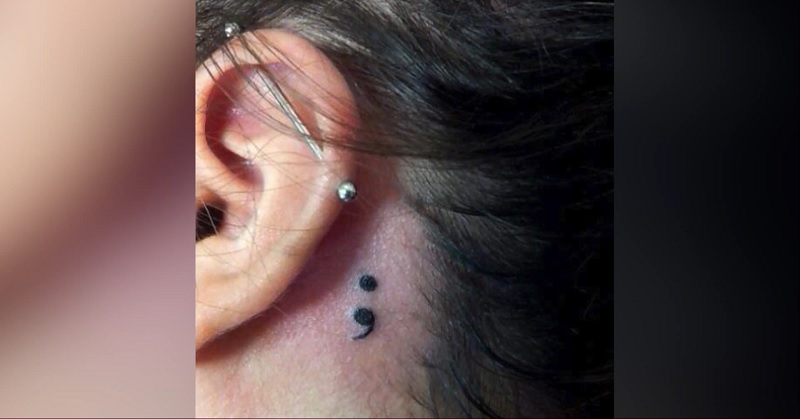If you’ve seen people or pictures of people with semicolon tattoos, you probably have wondered what the tattoos mean. Typically inornate and small in size, the semicolon tattoo might seem relatively unremarkable, but they’re cropping up everywhere, and they contain a tremendous significance.
While it may appear to be a flair for punctuation, what the semicolon tattoo actually represents is mental health struggles and the importance of suicide prevention.
Originating in Green Bay, Wisconsin, the semicolon tattoos originated from Project Semicolon, for those who struggle with self-harm, addiction, depression and suicide. It is also used in memory of those whose sentence has ended, like the father of the movement’s founder, Amy Bleuel. Amy has battled against mental illness and depression throughout her life. After she lost her father to suicide, she wanted to honor his memory in a special way. She also wanted to raise awareness for suicide prevention and other mental health issues, so she started Project Semicolon. The project aims to offer hope, love and understanding to those who battle depression, suicide, addiction and self-injury.
In the writing field, a semicolon is used when the author could have chosen to end their sentence, but chose to keep it going. It separates two connected thoughts. With the Project Semicolon, you are the author and the sentence is your life.

This movement is dedicated to prevention against the permanent solution that is suicide.
More than 300 million people globally suffer from depression. Because of the stigma associated with the condition, many suffer in silence, too embarrassed to speak up for fear of looking weak or becoming a burden. But Project Semicolon wants those who suffer from mental health illnesses to know while they might feel lonely, they are not alone. Part of the tattoo’s implication is a universal nod to that very notion. Programs like Project Semicolon create for those who suffer from depression a sense of global solidarity; the same brand of loneliness they feel is also on the shoulders of millions worldwide.
No matter what you’ve been through, if you struggle with depression, suicide, addiction or other such serious issues, you are not alone. Project Semicolon aims to support and encourage others to share their stories and get help when they need it, but they are not a 24-hour hotline. In an emergency situation, please call local authorities, a mental health professional, or 1-800-SUICIDE (784-2433) for help.
Learn more in the video below!
Sources:
Upworthy
Power of Positivity
Semicolon Tattoo;
WHO


